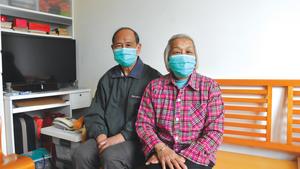 78-year-old Mui (left) and his 73-year-old wife, Hui, sit in their public-housing flat in Kowloon City on Tuesday, five days after their 14-day home quarantine ended. (WILSON CHEN / CHINA DAILY)
78-year-old Mui (left) and his 73-year-old wife, Hui, sit in their public-housing flat in Kowloon City on Tuesday, five days after their 14-day home quarantine ended. (WILSON CHEN / CHINA DAILY)
A 78-year-old surnamed Mui and his wife, Hui, 73, felt a huge sense of relief when their 14-day home quarantine ended on Feb 27. Being stuck at home, they felt like prisoners. Moreover, during the whole time, they felt guilty for causing inconvenience to people who helped them during their ordeal.
The couple had visited relatives in Taishan, a city in southern Guangdong province. When they got back in Hong Kong on Feb 13, they were told they could not step out of their 20-square-meter apartment until they finished their quarantine.
The Hong Kong government announced a mandatory 14-day self-isolation for all arrivals from the Chinese mainland in early February. That was among the emergency measures enacted to curb the coronavirus outbreak, whose epicenter is on the mainland.
They might otherwise have stayed on the mainland, but decided to return to Hong Kong to replenish Hui’s nearly exhausted supply of medications she needs to treat diabetes.
The couple said they submitted to the “necessary” and “acceptable” quarantine, and they did go through challenges and “awkward moments” during their confinement.
Smart wristbands
The couple were required to wear smart wristbands, 24 hours a day, so the government could monitor them and ensure they abided by the self-isolation. The wristbands send an alarm signal if the person steps out of the home door. Government officers set two smartphones in their home to work with the wristbands, as part of the monitoring system.
Elderly people living without smartphones and internet service often find high-tech gadgetry daunting and inconvenient.
On the very next day, after the monitors were set in place, Hui was alarmed by a call from the Department of Health informing her that an alert sent from the smartphone showed she had left her apartment and violated the quarantine.
“I was a bit confused and in panic,” said Hui, who declared she had complied with the quarantine in full.
“It is a big thing. Anyone breaches the order faces a fine of up HK$25,000 (US$3,200) and six months’ imprisonment,” she said.
After calming down, Hui thought she might have pressed a button on the smartphone and cut off the signal between the wristband and the phone. Neither she nor her husband had any idea of how to rectify the devices.
Hui explained the situation to the government officer on the phone and reconnected her wristband and the smartphone, step by step, according to the officer’s instructions.
“After that, we tried to avoid touching the phones for fear something would go wrong again,” Mui said.
Heartwarming moments
Not just the smart wristbands, but food, presented even more difficult challenges for the couple. Their family members are all in Guangdong. There was no one helping them to buy groceries and other necessities.
During the first week of self-isolation, Mui and Hui were too embarrassed to impose their needs on others. Their meals consisted only of vegetables they had bought on the way back home on the day they arrived and some food they had left in refrigerator before the Lunar New Year holiday.
After a week, their fridge was bare. The couple had to call the hotline number, arranged by the Social Welfare Department, for quarantined people in need of help.
“We didn’t know whether the government could help us solve food problems. I felt embarrassed asking employees to buy vegetables for us.” Mui recalled.
Beyond all of Mui’s expectations, a staff member assured him the department could provide two meal boxes, including meat and vegetables, for each person, every day.
“We didn’t need to cook by ourselves,” Mui said. Mui and Hui appreciated the social workers and the government staff who ensured they had something to eat every day. “They lent us a hand when we felt helpless.”
The government staff also gave them surgical masks to wear after the quarantine ended and gave additional guidance on caring for themselves.
The couple thanked the volunteers who give them an anti-epidemic package containing food and disinfectant after the quarantine. “These things are very useful,” they said.
Mui expressed his gratitude to the volunteers, social workers and government officers who helped to ease the stress of two week of challenges.
Although feeling like “being put behind bars at home” in those days, Mui and Hui reckoned compliance with the quarantine is a citizens’ duty.
“This is not only good for others who are worried about being infected, but also good for our own health,” Mui said.
More than 6,000 people were under home quarantine in Hong Kong by Feb 27, according to the Department of Health.
Having gone through their own trial amid the coronavirus outbreak, the couple extended best wishes and hopes for good health to all. They also expressed hope for an early end to the epidemic so that people no longer have to hide indoors.


